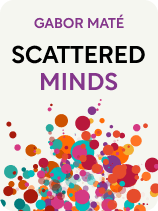

This article is an excerpt from the Shortform book guide to "Scattered Minds" by Gabor Maté. Shortform has the world's best summaries and analyses of books you should be reading.
Like this article? Sign up for a free trial here.
What are the best quotes from Scattered Minds? What can you take away about the development of ADHD from these quotes?
Gabor Maté is an internationally renowned family doctor with expertise in childhood development and the impacts of trauma on health. He argues that understanding the social and psychological roots of ADHD can help you treat it in your child without medication.
Take a look at Gabor Maté’s Scattered Mind quotes with context.
Quotes From Scattered Minds
In his 1999 book Scattered Minds, physician Gabor Maté argues that if you have ADHD, it’s because early childhood stress prevented you from developing the emotional-cognitive capacities you need to thrive in our world. Further, since ADHD isn’t just a biological disorder but one with social and psychological roots, he argues that medication isn’t the best or only way to treat your ADHD. Based on this perspective, he prescribes non-pharmaceutical treatments for both adults and children with ADHD and explains how society can prevent ADHD in future generations.
Here we’ll look at Gabor Maté’s Scattered Minds quotes that best reflect his ideas.
“We think that children act, whereas what they mostly do is react. Parents who realize this acquire a powerful tool. By noticing their own responses to the child, rather than fixating on the child’s responses to them, they free up tremendous energy for growth.”
Many children with ADHD exhibit defiance—an automatic reflex where the child rejects the parent’s demands, expectations, or instructions—and parents struggle to deal with that defiance without escalating the conflict. Maté explains that defiance is healthy to some extent—by defying you, your child sets herself apart as an individual, which is an important part of her development. Defiance is especially common in teenagers because it’s developmentally important for them to begin feeling more independent.
Maté suggests taking the following steps whenever your child is defiant: First, encourage your child to express their feelings, and validate those feelings even if your child isn’t going to get their way. Second, decide whether it’s worth enforcing your rules in this case—is it something trivial or a matter of their safety or well-being? Third, refuse to engage in a power struggle—it’s not about overpowering or imposing your will on them but getting your child to cooperate with you. Finally—and most importantly—after a disagreement, take the initiative to reconnect with your child as soon as possible. This reaffirms your perfect acceptance of your child: They know that no matter what they do, your relationship can’t be damaged beyond repair.
“So self-acceptance does not mean self-admiration or even self-liking at every moment of our lives, but tolerance for all our emotions, including those that make us feel uncomfortable.”
Accept yourself, including your difficult emotions and any behaviors you engage in but don’t necessarily approve of. Many people with ADHD struggle with self-esteem because they feel their condition holds them back from achieving their goals and getting others’ approval. You may even feel like there’s something innately wrong with you, which Maté attributes to the shame you felt every time the bond between you and your parents was ruptured. To gain self-acceptance, remind yourself that you’re doing your best and that healing is a journey—it’s okay if you’re not where you’d like to be yet.
Attend therapy. Maté explains that people have a deep-seated psychological need for validation from others, especially when they’re in pain. He says that a family therapist can provide you with that validation, help you understand your emotional pain, and support you in learning new psychological skills that can help you thrive.
Practice mindfulness. According to Maté, mindfulness improves your neurological capacity to focus; in addition, it may have other psychological benefits, like spiritual fulfillment, that help you heal the emotional pain that underlies your ADHD. He specifically recommends mindfulness meditation but notes that mindfulness can be incorporated into a vast array of activities, like spending time in nature.
Prioritize restorative recreation. Many people with ADHD overwork themselves as an outlet for their hyperactivity, but Maté says that in the long run, this only increases your stress. Instead, you should give yourself time to play, explore, and rest. For example, you might take up a creative hobby like crochet.
“There are two possibilities why your memories of childhood are so hazy,” I suggest to people. “Either nothing happened worth remembering, or too much happened that may be hurtful for you to recall.”
Based on anecdotal evidence from his life and the lives of his patients, Maté believes that the psychosocial basis of ADHD is early childhood stress.
Maté says that early childhood stress includes obvious stressors like neglect, abuse, or separation from your parents—but if you’re genetically predisposed to be highly sensitive, you were probably stressed by even the most subtly negative social interactions. Your parents may have been very loving and attentive toward you, but if they were stressed themselves, your home may have had an imperceptibly tense emotional atmosphere. Your sensitive temperament gave you greater, unconscious awareness of that tension—for example, on some level you may have noticed that your parents didn’t smile at you often enough. As a result, you became stressed too, even if you weren’t consciously aware that you felt stressed.
According to Maté, early childhood stress is harmful because it ruptures the parent-child bond—the set of consistently positive interactions (and resulting positive feelings) that occur between a parent and child.
“I do not believe AD[H]D leads to creativity any more than creativity causes AD[H]D. Rather, they both originate in the same inborn trait: sensitivity.
Maté says that the genetic basis of ADHD is a sensitive temperament, which predisposes you to ADHD by making you more susceptible to environmental stress. If you inherited a sensitive temperament, you’re biologically primed to readily pick up on and have more intense reactions to physical and emotional stimuli.
According to Maté, sensitivity can be advantageous—since you’re more attuned to the world around you, you take notice of the world’s most subtle complexities, and you’re given to feelings like awe, wonder, and appreciation. With those strengths under your belt, you could fill an important creative or spiritual role in society.
But sensitivity can also be disadvantageous because it makes you more likely to be negatively affected by your environment. For example, Maté cites studies that say people with ADHD are more likely to have allergies, lower pain tolerance, and higher emotional reactivity—their responses to both positive and negative emotions are just more extreme. If you’re more susceptible to environmental stress, you’re more likely to suffer the negative effects of stress—including the harmful impacts it can have on your developing brain.

———End of Preview———
Like what you just read? Read the rest of the world's best book summary and analysis of Gabor Maté's "Scattered Minds" at Shortform.
Here's what you'll find in our full Scattered Minds summary:
- How ADHD is caused by early childhood stress that hinders development
- Why medication isn't the best way to treat ADHD
- How society can prevent ADHD in future generations






